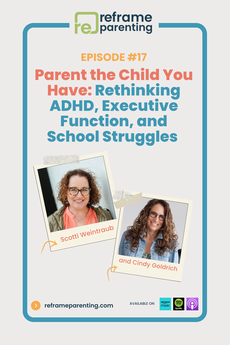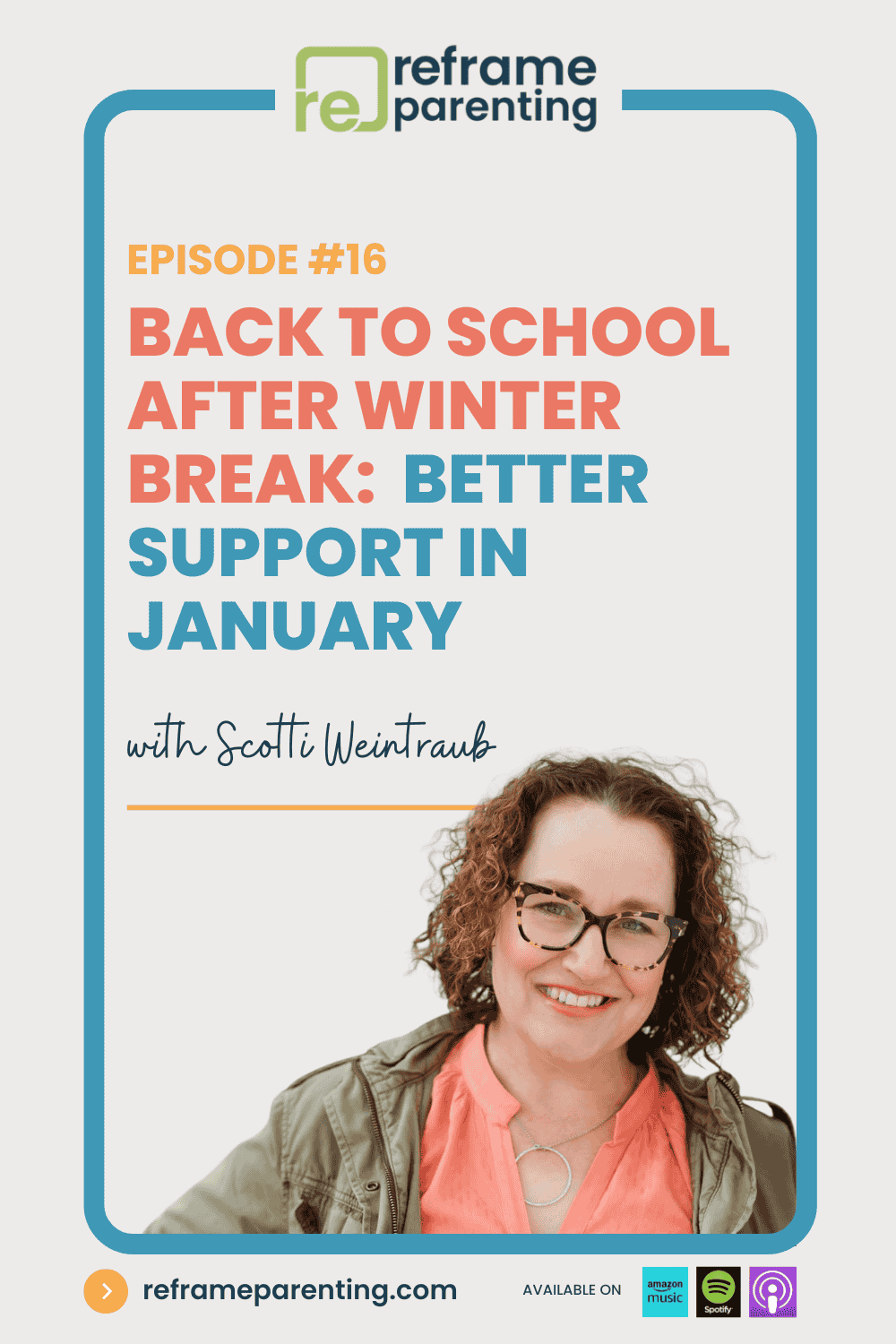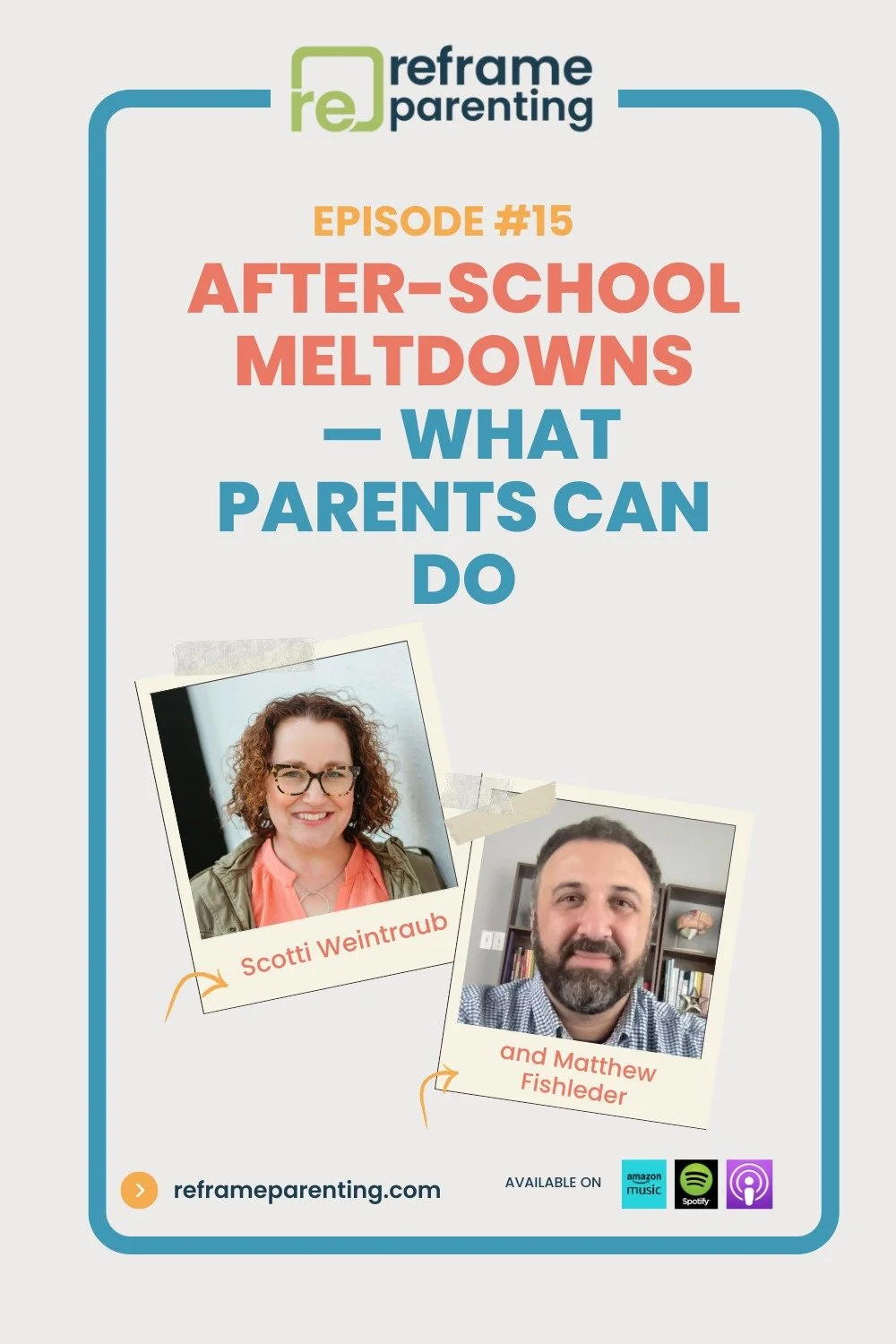3: The Truth About ‘Lazy’ Kids and Other School Myths
If you’ve ever caught yourself thinking, “Why won’t my kid just try harder?”—this episode is for you. We’re busting the myth of the “lazy” kid and digging into the real reasons behind missed homework, shutdowns, and school resistance. You’ll leave with a powerful reframe and one small challenge to help you respond with insight, not frustration.
Key Takeaways:
“Lazy” is rarely the real story. What looks like laziness is often anxiety, executive functioning challenges, sensory overload, or a learning difference.
Old school myths need to go. Messages like “they just need to try harder” or “they’re old enough to know better” do more harm than good.
Curiosity beats judgment. Asking “What’s getting in the way?” opens the door to understanding and support.
Small shifts change everything. One thoughtful pause can turn power struggles into progress—and frustration into insight.
Resources:
Want a low-stress way to reflect, plan, and feel more confident for fall? Join the School Success Lab: Summer Edition—a 2-month membership designed to help you prep smarter, not harder.
Take the Golden Girls inspired School Support Style Quiz to find your unique superpowers.
Connect with Scotti:
Website
Instagram
Threads
LinkedIn
Ask a Question:
Got a school question on your mind?
Submit it as a listener question for a future episode
Transcript
3: The Truth About "Lazy" Kids and Other School Myths
[00:00:00] Maybe this scenario sounds familiar. You ask your child to start their homework and nothing happens. You remind them again, still nothing, and somewhere between the frustration and the panic, the word creeps in lazy. But what if that's not it at all? In this episode, I'm digging into the truth about lazy kids and why that label misses what's really going on.
[00:00:26] We'll bust a few school myths that trip up even the most well-meaning parents and talk about how to shift our own thinking from blame to insight. Stick around to the end because I'll leave you with one simple challenge that you can use to shift how you respond the next time you're attempted to see laziness where there might be something else entirely.
[00:00:51] Welcome to Unlocking School Success. Podcasts with the smart strategies and support parents need to help their kids thrive. I'm your host, Scotty [00:01:00] Weintraub, parent coach, school navigator, and your go-to guide for turning School Stress and Chaos into clear strategies that work. Let's get started. Here's the thing.
[00:01:10] Most of us were raised on the idea that effort equals character, that working hard means you're responsible and more likely to succeed. Not working hard. Maybe that's a moral failure or a lack of drive or ambition. So when our kids don't seem to be putting in the effort, when they're not turning in that homework, or they're spacing out during class, it feels like they're being defiant or lazy, but that's not your fault.
[00:01:42] We've all had a lifetime of social training to see lack of effort as a red flag, and it's hard to shake the instincts even when we know better. That urge to jump in with, come on, just do it. Or Why are you being so lazy? It can be deeply [00:02:00] wired in all of us, but here's where I ask you to take a deep breath and a big pause.
[00:02:09] I named my business Reframe Parenting. 'cause I think if we look at things from a different angle, we can open up conversations rather than shutting doors. So here's my reframe on Lazy Kids. What looks like laziness is usually something else entirely. Years ago, I discovered the work of Dr. Ross Green, and I'll tell you, it changed the way I parent my own kids.
[00:02:36] One of his core tenants really hit home for me. Kids do well when they can, and if it can't, it's not about motivation, it's about lagging skills. Unmet needs or hidden roadblocks. So the question isn't, why won't they do it? It becomes [00:03:00] what's getting in the way of them doing it. I understand that some of you may be skeptical, and I get it.
[00:03:08] It's hard to pause and think about what might be really happening under the surface of that forgetfulness or the behavior challenge or the inability to turn in those assignments. But there can be real reasons behind them. So I'm just gonna give you a few. It could be executive functioning challenges.
[00:03:31] That includes things like trouble getting started, difficulty organizing our thoughts, remembering steps or prioritizing tasks. These can all be signs of challenges with the executive functioning related skills. If they aren't ignoring that essay, maybe it's just overwhelming or maybe they can't even figure out how to get started, or perhaps they have a hard time remembering assignments and need a system to help them be on more on top of it.
[00:03:58] The great news is that [00:04:00] these are skills that can be learned, or maybe it might be mental health, anxiety, depression, O-C-D, A-D-H-D, these. Are all real things that impact students in the classroom. What might look like. Lack of ambition may be a sign of depression, irritability, avoidance, or worry could be anxiety.
[00:04:25] Not being able to concentrate in a credit classroom could be a DHD. These can all have less obvious symptoms too, so it's important to talk to your doctor if you suspect there might be a mental health challenge underlying what's happening at school for your child. It could be learning differences. I want to remind everyone here that learning differences aren't about intellect.
[00:04:50] They just mean that those kids might need a different approach because their brains take in and process information differently. Or maybe it could be sensory overload. [00:05:00] This happens when a child's brain gets overwhelmed by too much noise, light movement, or other kinds of input, and it gets. Hard to focus or follow directions or feel calm.
[00:05:10] So busy classrooms can be really challenging and throw off their ability to learn or regulate their own emotions. So what looks like zoning out or acting out or being difficult is often a sign that maybe their nervous systems are an overdrive. So in light of all of that, I've got a few more myths that I'd like to nominate for long overdue retirement, Dave.
[00:05:35] Overstayed their welcome and will not be missed. Like they just need to try harder while trying harder doesn't help if you don't know how to start. And effort looks different for different brains, or how about they're being manipulative. Most kids don't wanna manipulate adults. They wanna be safe, understood, [00:06:00] and they want to be successful.
[00:06:04] How about they're old enough to know better? It's important for us as parents to remember that maturity isn't a linear process. Things like executive functioning and emotional regulation develop at different paces for every kid, and especially neurodivergent kids may behind some of their similarly aged peers with regards to this kind of maturity.
[00:06:30] How about my retirement? If they cared, they'd actually just do it. Well, I'll argue that kids often do care, and sometimes it's that caring that causes the shutdown. Perfectionism, fear, these can all masquerade as apathy. So what can you do as a parent when you start to feel that lazy label of frustration rise up?
[00:06:53] Well first, just get curious rather than judgmental. Ask, what part of this feels [00:07:00] hard? What's getting in their way? You could offer scaffolding to support them. That might look like breaking tasks down into smaller pieces that are more manageable or putting together a system to remind them to put that homework in their backpack, or helping them get the essay started or offering to brainstorm ideas together.
[00:07:22] Another thing to try is to zoom out. Think about what you know about your child. I. Do you know if there's a learning challenge, if they have anxiety or sensory sensitivities, what don't you know about that you could uncover? Are there resources out there to help? And finally build on what works? Take the pieces that do work and build on those successes.
[00:07:49] Where are places that they feel confident in school? And how can we maximize those experiences? None of this is about fixing your child. It's about seeing the why [00:08:00] behind the behaviors, the missed assignments, the drops in grades. So here's a simple use any time challenge to help you start uncovering why for your own child simply the next time that word lazy pops into your head.
[00:08:14] Pause and take a beat. Use that moment to ask yourself what else could be behind this. You've had a lifetime of messaging that tells you that kids should just try harder, push through and just get it done. That's not easy to unlearn. So give yourself some credit for even noticing when that label pops up, because awareness is a step in changing how you respond and what you say to your kids.
[00:08:42] Then just get curious. Is it a task that needs more support, a moment of anxiety, a skill gap that you hadn't noticed before? That pause, that little bit of space can shift everything. It can turn a power struggle into a conversation and your frustration into [00:09:00] insight about your child. And if you want support figuring out what's really going on behind your child's school struggles, that's exactly what we're going to do in the School Success Lab Summer edition.
[00:09:11] It's a two month membership starting June 23rd. That includes. Toolkits templates, checklists, live q and a sessions, and some bonus discounts for fall coaching too. You'll find the link in the show notes and all the information is on my website, so until next time, question those labels. Look for the why.
[00:09:34] The answer may be hiding right there.
[00:09:39] Thanks for tuning in to Unlocking School Success. If you're finding these episodes helpful, please hit follow, leave a review, or send it to another parent who's also navigating the school maze because no one should have to figure this out alone. You'll find full show notes at reframeparenting.com slash podcast and [00:10:00] you can come say hi on Instagram @ReframeParenting.
[00:10:03] Thanks again for listening. See you next time.








